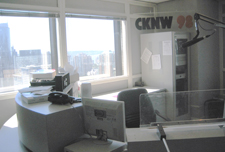Tod Maffin posted this on his website sometime ago, but I just had the chance to sit down and watch this recently. The End of Radio is one segment of a three part series on CBC Newsworld that tackles the idea of the way media is changing in the not so distant future, and you can watch this 22 minute program on their website.
The experts have spoken. Mass media is reported to be on its last legs. A handful of new media entities with remarkably silly names: Blogs, Vlogs, YouTube, Podcasts, and Yahoo! are leading the charge, leaving traditional forms of communications to play catch-up or get left behind.
The CBC’s pop culture specialist Jian Ghomeshi ponders the fate of mass media and asks whether we are nearing a world without television, radio or print in THE END, a three-part series airing on CBC Newsworld. [cbc.ca/theend]
I wanted to provide a link on my site as well because it’s a really interesting program. Of course I take intrest in the radio and podcasting portion of this report, but the other segments about TV and print make me curious as well. I should have watched them last week while being down with some sort of chest cold thing.

 I’m not so new to Vancouver to know that the word about
I’m not so new to Vancouver to know that the word about